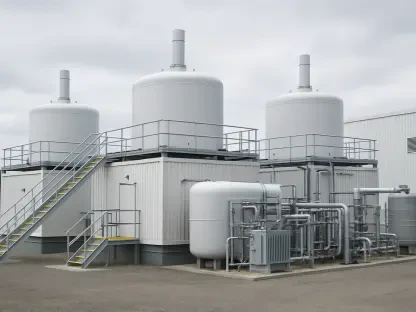What does it take to shine in an industry battered by economic headwinds and unpredictable costs? In the commercial building products sector, where every quarter tests a company’s grit, Apogee Enterprises (NASDAQ:APOG) has emerged as a standout with its remarkable Q2 earnings. Surpassing expectations with a revenue spike and a confident upward revision in full-year guidance, Apogee has not only outperformed analyst predictions but also set a new standard for its peers. This performance begs a deeper look into how one company can lead amidst uncertainty, offering a glimpse into strategies that could redefine success in this challenging market.
Why Apogee’s Q2 Results Turned Heads
In a sector often overshadowed by cyclical downturns, Apogee’s second-quarter performance became the talk of the industry. The company reported revenues of $346.6 million, reflecting a 4.6% year-over-year increase and beating analyst expectations by an impressive 6.3%. This achievement wasn’t just a number—it positioned Apogee as the top performer in estimate beats among its competitors, signaling a robust operational framework that others might struggle to match.
Beyond the headline figures, the significance of this result lies in its timing. With economic pressures like rising interest rates impacting construction activity, Apogee’s ability to deliver such growth highlights a rare resilience. The upward revision of its full-year EPS guidance further cemented investor confidence, suggesting that this isn’t a one-off success but part of a sustained trajectory.
Navigating the Rough Terrain of Commercial Building Products
The commercial building products industry is a battlefield of external challenges and internal innovation. Companies must contend with the cyclical nature of construction demand, often tied to broader economic indicators such as interest rates, while also managing volatile raw material costs that can erode margins overnight. These factors create a landscape where adaptability isn’t just an asset—it’s a necessity for survival.
Yet, within these constraints lie pockets of opportunity. The push for energy-efficient materials is gaining momentum as sustainability becomes a priority for builders and architects alike. Additionally, innovations aimed at addressing labor shortages, such as streamlined installation processes, are reshaping how firms operate. For players like Apogee, capitalizing on these trends while mitigating risks has proven to be a winning formula in a tough environment.
Unpacking Apogee’s Stellar Q2 Metrics Against Industry Peers
Diving into the specifics, Apogee’s Q2 earnings painted a picture of dominance. The $346.6 million in revenue not only marked significant year-over-year growth but also outstripped forecasts, with EBITDA results similarly exceeding expectations. This performance stood out in a group of five tracked companies in the sector, which collectively beat revenue estimates by an average of 2.3%, while their stock prices rose by 5.3% post-earnings.
Comparatively, Insteel (NYSE:IIIN) showcased its own strength with a remarkable 23.4% revenue growth to $179.9 million, the highest in the peer group. However, despite beating EBITDA and EPS estimates, Insteel’s stock remained flat at $38.06, unlike Apogee’s 4.2% climb to $41.35. This divergence in market reaction underscores how investor sentiment can vary, even among top performers, often reflecting deeper trust in long-term strategies over raw numbers.
Analyst Perspectives on Apogee’s Market Edge
Industry experts have been quick to weigh in on Apogee’s standout quarter, offering insights into what sets the company apart. One analyst noted, “Apogee’s knack for exceeding forecasts in a difficult economic climate points to exceptional operational efficiency and a keen alignment with market demand for sustainable solutions like high-performance glass.” This perspective highlights how strategic product focus can drive results beyond mere financials.
Market sentiment mirrors this optimism, as evidenced by Apogee’s stock price increase following the earnings release. The company’s involvement in high-profile projects, such as the iconic Apple Store on Fifth Avenue, further bolsters its reputation for delivering value in architectural solutions. Such feedback from analysts and investors alike paints Apogee as a leader not just in numbers, but in vision and execution within the sector.
Lessons from Apogee for Industry Stakeholders
Apogee’s Q2 success offers valuable takeaways for both competitors and investors navigating the commercial building products space. A clear focus on innovation, particularly in energy-efficient offerings, has allowed the company to tap into growing market demand while maintaining healthy margins. This approach serves as a blueprint for others aiming to differentiate themselves in a crowded field.
Equally important is the emphasis on cost management. Despite fluctuations in raw material prices, Apogee demonstrated an ability to protect profitability through operational adjustments, a lesson in agility for peers facing similar pressures. For investors, the disparity in stock reactions—Apogee’s rise versus Insteel’s stagnation—suggests that betting on firms with strong strategic narratives can yield better returns than focusing solely on quarterly figures.
Reflecting on a Defining Quarter
Looking back, Apogee’s Q2 earnings stood as a testament to what was possible in the commercial building products sector, even under trying conditions. The company’s ability to surpass expectations and inspire market confidence through a 4.2% stock price gain spoke volumes about its strategic prowess. Meanwhile, peers like Insteel, despite strong growth, reminded stakeholders that financial wins alone didn’t always translate to investor enthusiasm.
As the industry moved forward from that quarter, the path ahead seemed to hinge on embracing innovation and operational flexibility. Companies were encouraged to prioritize sustainable products and efficient processes to stay competitive. For investors, the challenge became identifying firms with both solid fundamentals and compelling long-term visions, ensuring that the lessons from Apogee’s success shaped smarter decisions in an ever-evolving market.









